Energia-Buran Soviet Space Shuttle System (1988)
About the Design
The most expensive project in the history of the Soviet space program, the Buran (meaning "Snowstorm" or "Blizzard" in Russian), was the U.S.S.R.'s answer to the American Space Shuttle. Started in the early 1970s, the Buran project climaxed on November 15, 1988 with the launch of an unmanned, fully automated orbiter strapped to an Energia booster.
Although nearly identical on the outside to the American Shuttle, the Buran had a vastly different interior and could, in fact, carry a larger payload than its U.S. counterpart. And unlike the American Shuttle, the Buran had no main rocket engines; the massive Energia booster did 100% of the heavy lifting to get the craft into orbit. The Buran would have probably been a serious rival to the Shuttle if not for the subsequent collapse of the Soviet Union. The newly formed Russian Federation could not afford the system's hefty price tag and so formally cancelled the project in June 1993. Two additional Burans were under construction at the time and were left uncompleted. No manned flight was ever attempted. The price tag for the entire project: 200 billion rubles. |
About the Kit
The Energia-Buran was the first of STC Start's series of 1:288 Soviet/Russian launch vehicles, a line that eventually included nearly a dozen different subjects. The Energia-Buran kit was of moderate quality detail-wise and came with a flimsy, fragile decal sheet.
The model was built from the original issue. |


